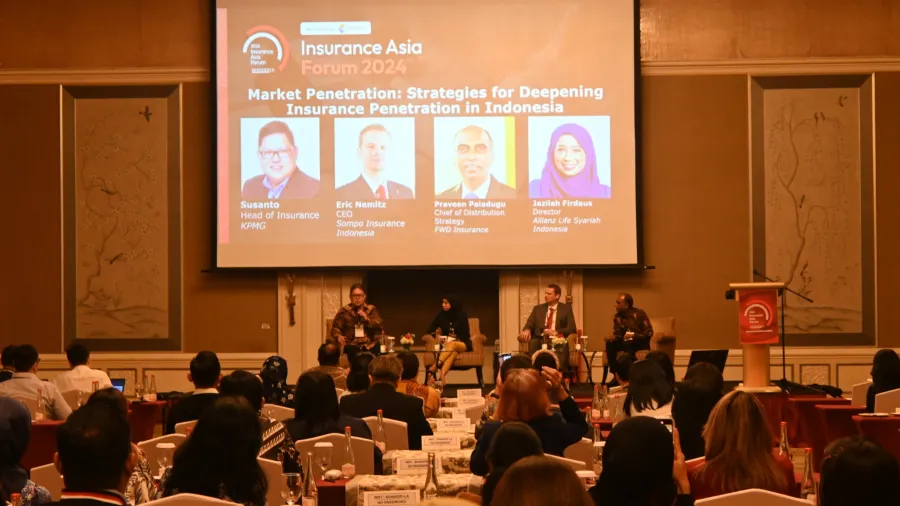
Digital distribution key to Indonesia market penetration
Insurance leaders share insights on navigating risks, boosting sales, and enhancing customer engagement.
INDUSTRY players and thought leaders in Indonesia’s insurance sector gathered at the Insurance Asia Forum in Jakarta, bringing to fore emerging risks, digital distribution, fraud prevention, and market penetration strategies amidst the country’s unique challenges.
The event held on 14 May at the Shangri-La Hotel highlighted a low insurance literacy amongst the population and difficulties in digital distribution partly due to the archipelagic make-up of Indonesia.
Macro risks
In the presentation of Tek Yew Chia, head of insurance for Asia Pacific at Oliver Wyman, titled “Asia Macrotrends and Implications for Insurers,” he introduced the concept of “Perma Crisis” — explained simply the reality of how significant events occurring monthly change lifestyles and increase uncertainty.
He noted a 10% yearly increase in progressive tipping points with catastrophic outcomes.
Key macro risks include US-China tensions, which may lead to supply chain shifts and a focus on resilience, new economic corridors between Asia and the Middle East, and the rise of Tier 2 and Tier 3 cities.
On top of this, there is Asia’s aging population, especially in China, which also poses a significant challenge.
To navigate these risks, Chia advised companies to embed strategic agility, manage economic uncertainty, handle supply chain disruptions, leverage technology, deliver major transitions, attract and retain talent, and respond to political violence.
Digital distribution dynamic
The second session was a C-level Fireside Chat between Tim Charlton, publisher of Insurance Asia, and Cherdchai Virabhak, Chief Technology & Operations Officer at FWD Insurance.
Cherdchai, who previously served as the Head of Group at FWD Insurance before relocating to Jakarta, discussed “Digital Distribution Dynamics: Maximising Reach & Efficiency” which focused on post-COVID-19 acceleration of distribution channels to meet customer expectations and increase sales revenue.
“We see the importance of business trust in insurance, managing risks in our channels through both direct and app-based channels,” he said.
Cherdchai stressed that managing different channels is crucial, not only in terms of technology but also in practitioners’ capabilities. Technology is used to educate consumers about their needs, the appropriate insurance product propositions, how companies interpret data, design products to meet needs, and integrate them into digital distribution.
“When distributing products through certain channels, we also consider post-sales interactions, optimising customer journeys,” he said. Cherdchai also noted numerous opportunities for development related to distribution partnerships in Indonesia.
Digital distribution channels
Moderated by Bernadeth Saoria L. Gultom, partner in Consulting for Financial Services at EY Indonesia, Panel 1 included Sukma Darman, head of Digital at Zurich Indonesia, and Erickson Mangunsong, technical director at PT Asuransi Etiqa Internasional and chairman of Internal Relations at the General Insurance Association of Indonesia (AAUI).
The panelists discussed experiences with digital distribution channels, with Erickson anchoring his talk on optimising data processing and technology to personalise customer experiences.
Sukma spoke on how Zurich Indonesia uses data to enhance products and leverage partnerships and mentioned striving for an omni-channel approach and collaborating with major partners for a seamless experience.
Erickson also highlighted the challenge of building ecosystems through partnerships with banks and multifinance companies and stressed the importance of digital leadership and collaboration.
Fraud prevention and detention
Nila Luthfiana, head of Compliance at AIA Indonesia, presented the topic “Fraud Prevention and Detection: Enhancing Capabilities to Reduce Losses,” reporting a 60% increase in significant fraud in the past two years.
Nila explained various types of fraud in the industry, such as sales conduct (misinterpretation of products), claim fraud (false claims and fake death certificates), and data theft (changing personal data followed by withdrawals).
Insurance companies need to prioritise fraud prevention and detection and employ fraud mapping. “Key strategies for fraud prevention include data-driven approaches, collaboration and information sharing, including partnerships with law enforcement and regulatory agencies, technology and innovation, and empowering staff,” said Nila.
Enhancing fraud detection also involves proactive monitoring, adaptive systems, investigative techniques, and regulatory compliance, she added.
Market penetration strategies
In the Jakarta forum’s final session, Susanto, head of Insurance at KPMG Indonesia, moderated the panel discussion on “Market Penetration: Strategies for Deepening Insurance Penetration in Indonesia.”
The panelists included Eric Nemitz, CEO of Sompo Insurance Indonesia; Praveen Paladugu, chief of Distribution Strategy at FWD Insurance; and Jazilah Firdaus, Director of Allianz Life Syariah Indonesia.
Susanto said that over the past five years, the growth rate of premiums for conventional insurance was relatively modest, averaging 1.89% per year. Specifically, conventional insurance premiums grew by only 0.9%, whilst Sharia insurance contributions saw a significant increase of 15.7% during the same period.
Despite this significant growth, however, Susanto noted that Sharia insurance’s market share remains small compared to conventional insurance.
Praveen, for his part, addressed the cost challenges posed by Indonesia’s archipelago geography, emphasizing the need for simple, relevant insurance products. What we do is provide insurance products that match customer needs and are simple to understand, making insurance products relevant to customers,” he said.
Sompo’s Nemitz pointed out the low insurance market cap in Indonesia — averaging USD 5,000-6,000 — and the importance of improving product services and accessibility. “Besides improving product services and relevance to customer needs, it is also necessary to consider accessibility, making it easier for customers across Indonesia to reach and purchase insurance,” he said.
Finally, Jazilah highlighted the barrier of low insurance literacy and the less popular Sharia insurance. She stressed the importance of gaining customer trust, understanding products and benefits, and implementing Sharia principles transparently.
“Insurance is a trust business; gaining customer trust in both conventional and Sharia insurance is crucial. It is also important to understand the products and their benefits. In Sharia insurance, we strive to implement the concept of collaboration, and all our products are developed based on Sharia fatwas and are transparent in terms of claims,” said Jazilah.




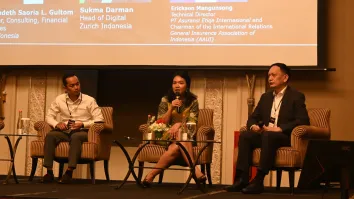
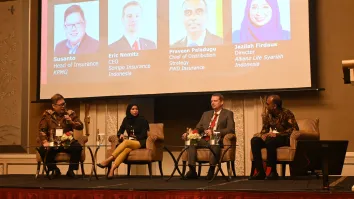


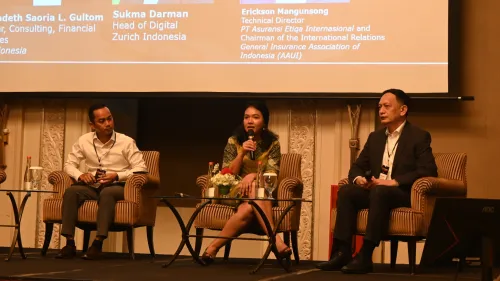
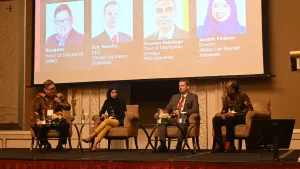

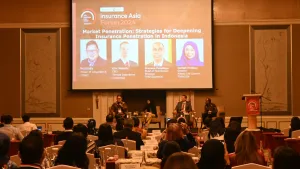
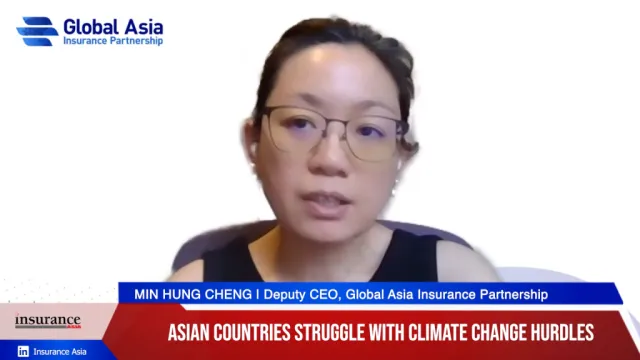

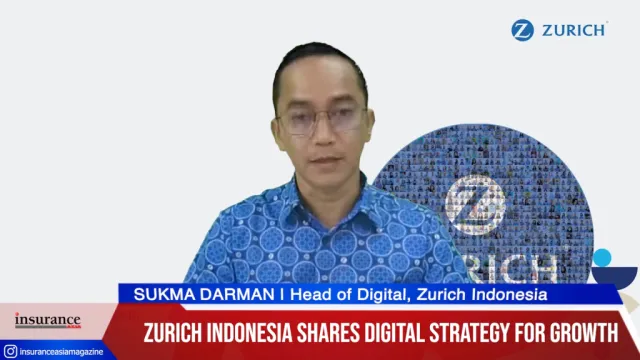

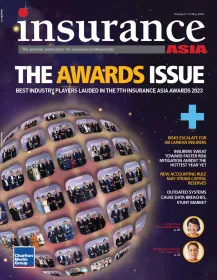
 Advertise
Advertise






